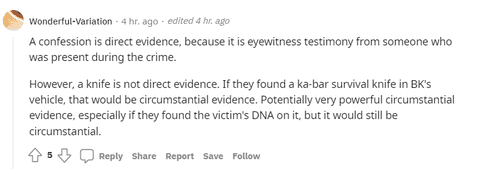'We need the knife': Internet wants 'hard evidence' against Bryan Kohberger as murder weapon still missing

This article is based on sources and MEAWW cannot verify this information independently.
MOSCOW, IDAHO: Bryan Christopher Kohberger, 28, who was arrested and charged with the brutal murders of four University of Idaho students, appeared in court for a brief hearing on Tuesday, January 3, and didn't contest his extradition to Idaho. Kohberger is maintaining his innocence but is not fighting the extradition, saying he is eager to fight the charges normally. Internet users who are consistently following this case are worried that there might be a 'lack of direct evidence', and some believe that the murder weapon is 'hard evidence'.
Ethan Chapin, 20, Xana Kernodle, 20, Madison Mogen, 21, and Kaylee Goncalves, 21, were found stabbed to death on November 13 in their off-campus rental home on King Road. Kohberger was arrested at his parents' home in eastern Pennsylvania, more than 2,500 miles away from the town of Moscow on December 30. Kohberger is a PhD student in the Department of Criminal Justice and Criminology at the neighboring Washington State University.
RELATED ARTICLES
A concerned Reddit user questioned, "What happens if there’s no hard evidence?", adding, "While I hope and pray they find DNA under one of the victims nails or teeth to convict BK, I fear the possibility that there’s lack of direct evidence but there’s overwhelming circumstantial evidence such as cellphone data, CCTV footage, or touch DNA etc which should ideally convince the jury. To me the idea that one has to locate hard evidence such as the murder weapon or DNA in specific places on the victims body makes it a lot harder for the prosecution and easier for the killer if he meticulously planned the crime."
Another user wrote that the 'no-knock warrant' hints that there is some solid evidence. "I feel like the fact that they served a no-knock warrant at 0300 at his family home is a fairly good indication that they have solid, irrefutable evidence," wrote the user.

A user added that the knife may not be essential, saying, "So many people have the wrong idea of circumstantial evidence. I saw someone earlier comment that "wE nEeD tHe KnIfE."....No we don't. The Aaron Hernandez case where he was found guilty of 1st degree murder. There was no gun or weapon found. The case was mostly circumstantial."

Another user agreed and wrote, "If the murder weapon was needed to convict, so many people would not be in jail right now."

"A confession is direct evidence, because it is eyewitness testimony from someone who was present during the crime. However, a knife is not direct evidence. If they found a ka-bar survival knife in BK's vehicle, that would be circumstantial evidence. Potentially very powerful circumstantial evidence, especially if they found the victim's DNA on it, but it would still be circumstantial," wrote a user.

A user pointed out that 'circumstantial evidence can be more compelling than direct evidence'. "So the circumstantial evidence can actually be more compelling to a jury than direct evidence. Most crimes are solved with circumstantial evidence. Jurors are often advised by the court to weigh direct and circumstantial evidence equally. Also, the more pieces of circumstantial evidence they have, the more likely it is a suspect committed that crime based on probability and statistics. While X number of things could happen, the idea of all of these things happening at once is unlikely beyond a reasonable doubt," wrote the user.

"I think video/cellphone data showing his car there and him inside the house around the time of the murders would be enough," wrote another user.

Whereas one user expressed their fears and believed that 'DNA is not always the nail in the coffin'. "I feel like a lot of people dismiss this concern OP but you are correct. Right now with the limited view we have on the case I’d imagine a lot of defense attorneys around the country are looking at this as a very winnable case. My worst case scenario for the prosecution would be that they only have touch DNA at the crime scene and the car somehow comes back clean. That would leave potentially, no motive, no murder weapon, no criminal history, a car that was technically 2 years older than what the police said they were looking for. At that point the defense can simply say he was at the house at a party at some point, prosecution will say he never was, and that’s essentially reasonable doubt. I hope they have more but I’m not sure. Everyone views DNA as the nail in the coffin but that’s simply not the case at times, many variables," wrote the user.

This article contains remarks made on the Internet by individual people and organizations. MEAWW cannot confirm them independently and does not support claims or opinions being made online.










